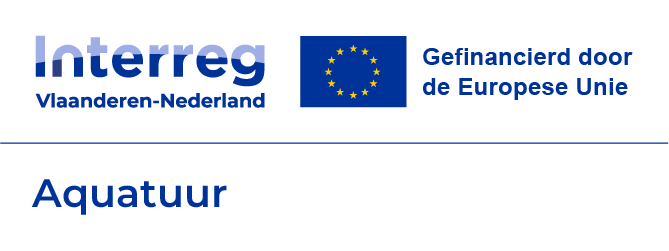In the Interreg Flanders-Netherlands project Aquatuur, the partners want to increase freshwater availability and create a robust water system. They want to achieve this with green-blue solutions. At the same time, these natural solutions must provide the necessary functions and services.

The project focuses on water storage, water purification and increasing the repeatability of these solutions. Researchers from HZ's Water Technology research group are focusing particularly on water purification through so-called constructed wetlands (CW's).
The HZ, UGent, VITO and the Province of Zeeland demonstrate how CW's can purify surface water into an alternative water source for sectors such as agriculture, nature, drinking water production and industry with different quality requirements in the Netherlands and Flanders. The CW's are being built at Evides' Assenede pumping station in East Flanders and use run-off polder water that would otherwise flow into the sea. Previous research shows that the water quality does not meet various quality requirements. In this subproject, the researchers want to study the removal of metals, PAHs, pesticides, microplastics and PFAS by CW's.
There will be a flexible test rig demonstrating which type of CW is most suitable and which design parameters are needed. The setup is about 120 square meters in size and can treat about 20 cubic meters of water per day.
It consists of a settling basin with floating wetlands and five different types of CW's: above/underflow, with/without aeration and biochar, different plant species. Combination with other technologies, such as activated carbon and UV, are being tested in the lab. The researchers are studying hybrid technology, treatment efficiencies and costs.
Knowledge centers work across borders
The knowledge centers and the province of Zeeland want to increase freshwater availability in the Scheldemond region through this solution. Evides supports the case by making land available. They are looking for alternative water sources and want to reduce the pressure on current drinking water sources. The knowledge institutions are responsible for the preparation, realization and monitoring of the CW's and analyses.
Midterm Update
Since the start of the project, researchers at HZ have been investigating the replicability of implementing nature-based solutions. Interviews have been conducted with water managers, provincial authorities, consultants in the fields of water and agriculture, and local councils. In addition, a series of workshops has been organised to gain deeper insight into the non-technical barriers (such as legislation and required knowledge) that hinder the implementation of nature-based solutions to improve both water quantity and quality.
Pereboomsgat
In Pereboomsgat-Moerbekepolder, one of Aquatuur’s seven demonstration regions, stakeholders have come together to explore opportunities for shared value. This process was undertaken to gain a better understanding of the non-technical barriers involved in implementing nature-based solutions. During workshops with provincial authorities, local farmers, nature managers, advisers, and research institutions, the participants explored how different interests – from freshwater availability to cultural heritage – are interconnected. This dialogue led to a shared ambition: an integrated approach in which nature, agriculture, and recreation reinforce each other.
Process
The project follows a carefully structured process to arrive at broadly supported solutions:
Preparation and Exploration
-
Discussions with local stakeholders (polder boards, farmers, nature organisations) to identify needs and challenges
-
A hydrological quick scan to analyse the water balance and opportunities for water buffering
Workshops and Value Dialogue
-
Three interactive workshops in which participants prioritised values such as water safety, agricultural yields, and biodiversity
-
Joint analysis of the relationships between values (e.g. how does water level management affect both nature and agriculture?)
Development of a Value Model
-
Translation of insights into a practical model to inform policy and guide measures
-
Focus on integrated solutions such as flexible water level management or nature-friendly banks, serving multiple objectives
Next Steps: Implementation and Support
-
In 2025, the concrete ideas from the workshops will be further developed and documented
-
Continued involvement of all parties is essential for implementation
-
A process analysis will be shared at a cross-border water management event so that other regions may learn from it
More information about the project can be found on the project website.
